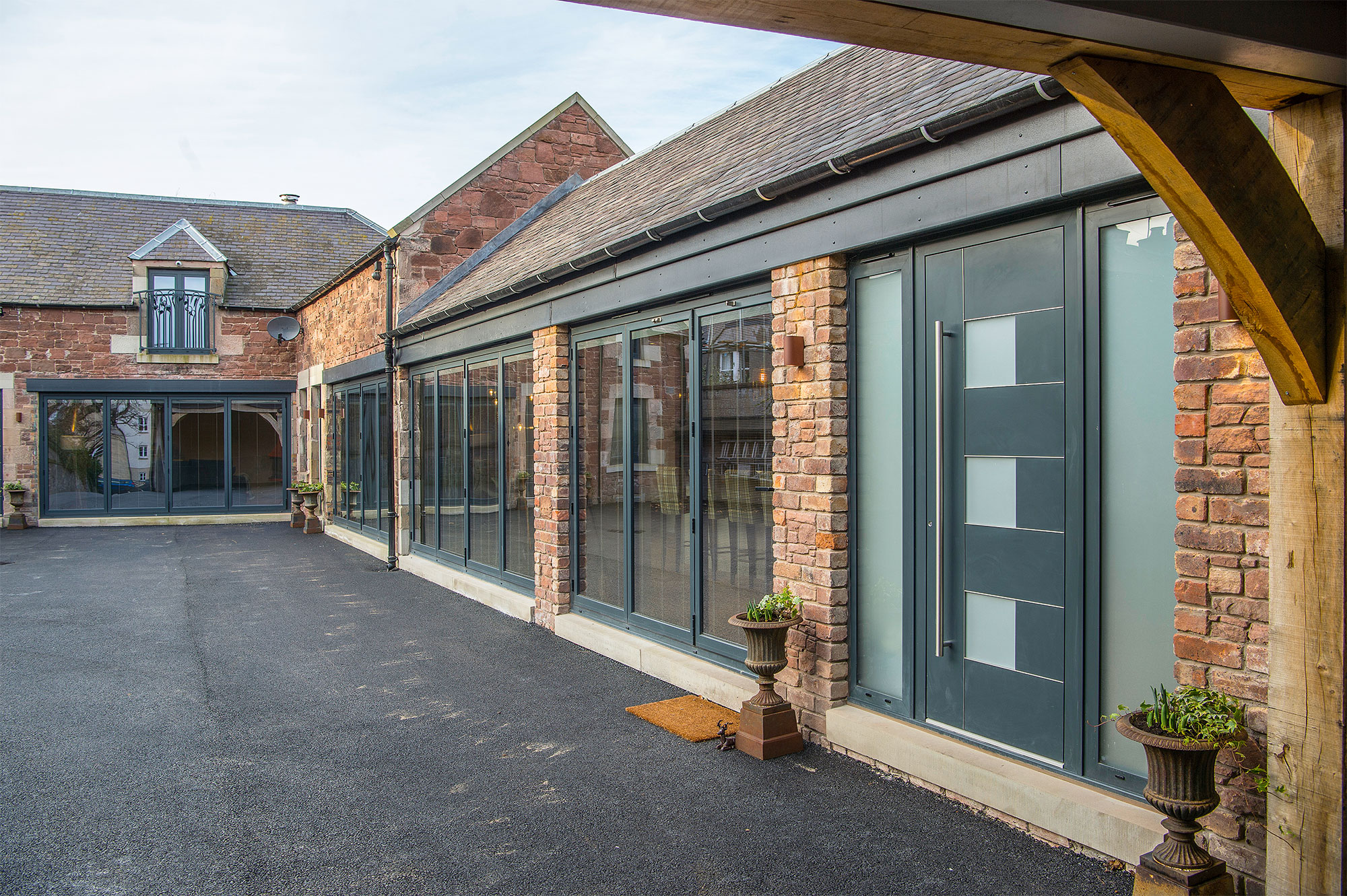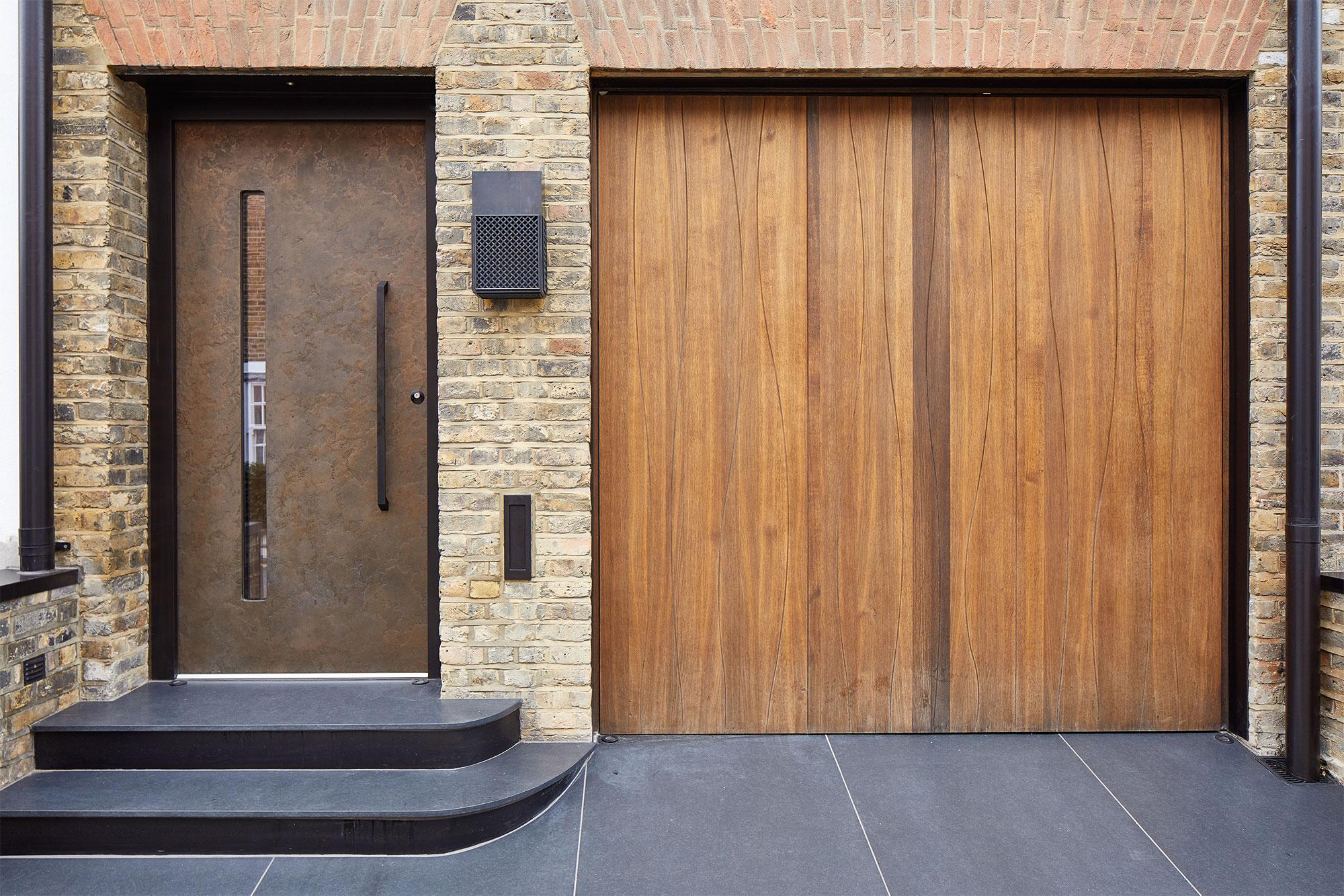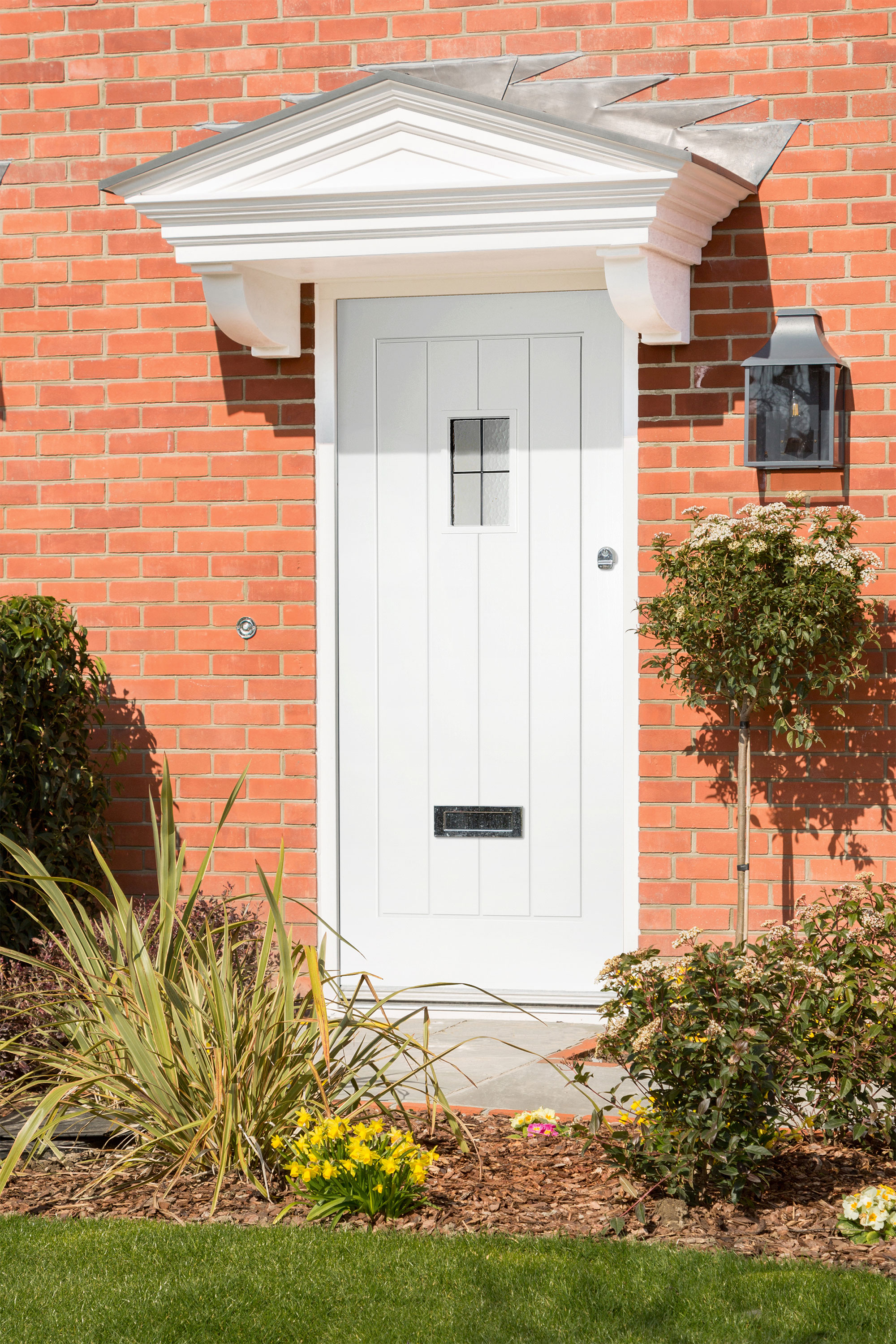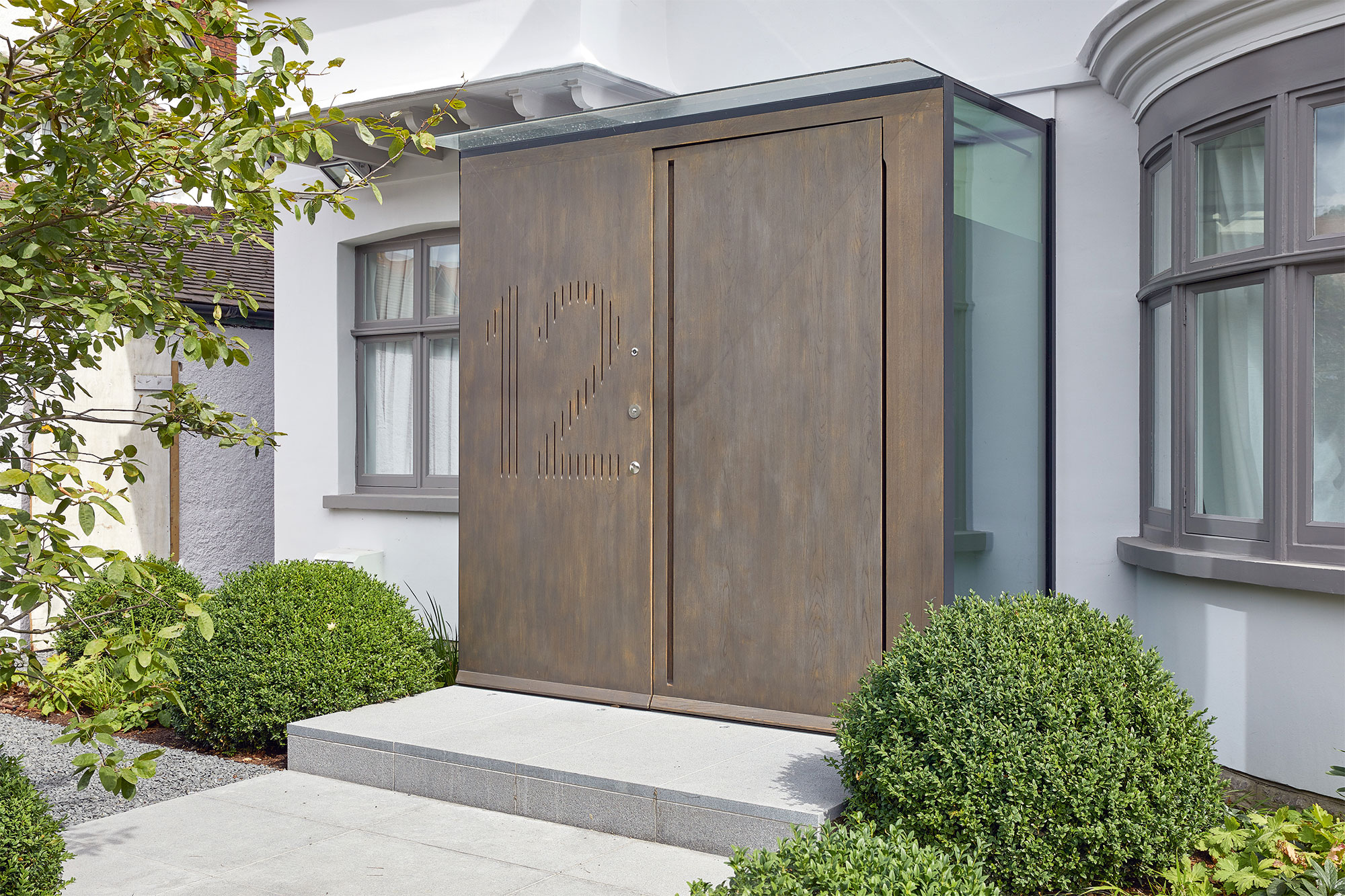As well as serving a practical purpose – to provide an entrance point to your home and an effective barrier to burglars – your front door can have a powerful visual impact on the overall aesthetic of the house.
Whether you’re building a property from scratch or renovating an existing structure, this feature will be one of the first things a visitor lays eyes on.
It’s vital, therefore, to select a model that works in harmony with the architectural style of the dwelling. Plus, you’ll want to choose a design that stands the test of time in terms
of style and performance.
“Think outside the box – there are so many different options out there. Take your time to see what these are,” says Elizabeth Assaf, a designer at Urban Front.
“Be bold so that the entrance stands out.” From material and surface texture options through to accessories and ironmongery, here’s a closer look at what’s available.
Using glazing
As well as establishing unique visual character from the outside, incorporating glass into your front entrance – either in the form of a glazed panel or sidelights – will help to bathe your hallway with natural brightness.
A pane could also be incorporated above the doorway, if the height is available. For a contemporary, asymmetric look, incorporating glass on just one side of the opening could work well, too.
“Modern aluminium front doors look stunning from the outside but internally they’re very dark and plain, so glazing is a good way to introduce illumination” says Steve Bromberg, managing director at Express Bi-Folding Doors.

Made from aluminium, the Caverro front door forms a striking modern contrast to the traditional brickwork of this house. Priced from £2,000, this model is from Express Bi-Folding Doors
“A side or top light is perfect for this. If there isn’t space, then an element of glass should be incorporated within the panel.”
Front door size
Incorporating an oversized front door can be another clever route to making a strong visual statement – particularly if you’re building a contemporary home or converting a barn.
Historically, domestic doors were made smaller as a means to keep warmth inside, so upping the size is an effective way to introduce a modern flourish.
“It transforms the entrance into a focal point,” says Steve. “Often, the doorway is centralised in the front elevation, so an oversized panel looks strong and secure. It gives a real indication that the owners are proud of their abode.”
Of course, this design solution is only viable if the house is large enough to accommodate a bigger opening. If you’re keen to incorporate an oversized entrance, bear in mind that the dimensions will still need to work in harmony with the proportions of the whole building.
find doors in our product directory
It’s worth consulting your architect to ensure the door complements the structural makeup and suits the positioning of the rest of the fenestration.
Discreet design
Incorporating a ‘hidden’ front entrance that blends with the elevation can give you a sleek, stylish result.
This solution is particularly effective for minimal homes featuring clean, contemporary architecture. It also works well on projects where the external materials are being used to make the principal design statement.
“If the outside of the house features cladding, it’s quite exciting to be able to hide the door within the wall finish,” says Elizabeth.

he contrast between the front entrance and garage doors, both supplied by Urban Front, shows how surface texture can be used to make a design statement. The Erano e80 hinged doorset is priced from £15,000. Made from fumed oak with a Wavi pattern finish,
the up-and-over automated garage entrance starts at £18,000
“It’s a little complicated to achieve as you have to line up all the boards with the door. As you’re making the entrance panel off site and bringing it in later, you need to ensure the measurements match.”
In order to attain a seamless effect, the entrance should sit flush with the floor. That way, the door is only really revealed when it is opened.
“It’s essential to have your architect, builder and supplier work together to achieve this, with all the correct calculations,” says Elizabeth.
Country chic
Traditional front doors come in a plethora of styles, from period through to rustic finishes. If you’re looking for a doorway that complements a farmhouse look, selecting the right material is key. Warm wood tends to work well to create characterful allure.
“There’s nothing better than oak when it comes to creating a traditional look,” says Matthew Todd, managing director of Todd Doors.
“Modern products are stable, secure and well-insulated. Composite versions are also available so you can achieve an authentic look without compromising on modern manufacturing tech.”
Another route to creating a traditional, country-style entrance might be to incorporate a rustic oak frame porch structure.
As well as introducing a traditional visual element, this feature will provide protection from the elements if you ever need to spend a few moments rummaging in your bag for keys.
Porches & coverings
Incorporating an entrance zone offering some protection from the weather can work well for modern designs, too.
While a simple canopy positioned over the front door will provide some shelter, an open-sided cantilevered structure could infuse your home with some extra contemporary wow factor – if your budget allows.

Supplied by Todd Doors, the Hillingdon design comes in a selection of attractive finishes – arctic white (pictured), hush grey, and anthracite black. Hardwood veneer infuses the entrance with traditional appeal and works in harmony with the canopy-style porch. Prices start at £280
Bear in mind that it’s likely that extra steelwork will be needed in order to achieve a truly cantilevered design.
In addition to the expertise of an architect, you may also be required to bring a structural engineer on board. Alternatively, siting your front entrance within a car port could provide a dual-purpose solution if you’re keen to enter your home via a covered approach.
Bold door colours
Adding a vibrant burst of colour is another effective route to ensuring your front entrance stands out.
Selecting a shade that contrasts with the rest of your home’s external materials palette can also be a smart move, particularly if tracking down a finish that matches perfectly is proving to be a challenge.
“Going for something bold and different is the best way to make a real design statement,” says Steve.
However, there’s a couple of important practical considerations to think about before splashing out on your chosen product.
“Selecting a door that’s supplied pre-finished can be cost-effective, as the final coating is applied in a controlled environment,” says Matthew. “Most manufacturers can finish to any RAL colour and will spray apply the top coat – far better than buying a great door, having it professionally fitted and then ruining it with a shoddy paint job.”
Surface texture
When it comes to choosing a finish for your door, several factors will come into play. This decision will have a massive impact on the look and feel of the entrance, of course – but you also need to consider practical issues such as the level of maintenance required.
“Texture, pattern and character are all in force for this new season of trends,” says Elizabeth. If you don’t want to go for a natural finish, then the surface of a timber door can be manipulated to create quirky grooves, patterns and effects.
“Creating expression and depth is an exciting option with wood and very achievable thanks to the material’s warmth and grainy texture,” she continues.

Urban Front supplied the e80 pivot doorset, which has been fitted into a boarded Onyx-finished panel, complete with number engraving. IQ Glass fitted the entrance into frameless glass for extra wow factor
However, homeowners keen to create an out-of-the-ordinary surface finish aren’t limited to timber.
“The metallics trend is still very strong, with copper and bronze as the forerunners,” says Elizabeth. “There has been lots of interest in the industrial look, as well as corten or blackened steel. That rough beauty certainly seems to be gaining steam.”
Lighting for front doors
As well as offering clear benefits from a home security perspective, incorporating artificial lighting round the front entrance can boost your home’s kerb appeal after dark.
Cleverly-positioned fittings can also be used to conceal any less attractive areas, drawing the eye to the aspects you want to highlight.
If you’re keen to establish a traditional aesthetic, lantern-style products positioned on either side of the front door can create a warm, welcoming effect. For a more contemporary look, architectural up/downlights can infuse the entrance zone with extra drama.
Consider seeking the advice of a specialist lighting designer for elaborate illumination schemes.
Read more: Using a lighting designer for your home
Statement ironmongery
Close attention to detail can often make the difference between a standard front door and one that truly stands out.
There’s a myriad of options available, with lever and pull handles that come in an array of shapes and sizes. There’s plenty of choice when it comes to material, from warmer-hued metals like rose gold and copper to cool, crisp finishes of stainless steel or aluminium.
Think about how you’ll interact with the handle on a day to day basis, too. For example, do you want a design that incorporates a lock so the door stays open when on the latch?
When it comes to choosing a bar handle for your entrance, pay close attention to the proportions. “The rule of thumb for domestic properties is to go for something that’s no more than half the size of the door,” says Elizabeth. “Also, consider how your hand feels around the handle. Some square edge designs look good, but they aren’t always very comfortable.”
Finishing touches
While it may be the final step to designing your front entrance, selecting the right accessories – door bell, letterbox and house number – could make or break the overall scheme.
For traditional homes, a simple plaque with the house name/number adjacent to the door could be best.
However, if you want to splash out on something special, you might choose to have this detail etched into the glass in your door panel. If you’ve specified a wooden entrance, another option is to have the figures carved directly into the timber surface.
Either of these solutions does away with the need for introducing additional accessories, which is great for establishing a clean, minimal look.
The post 10 Front Door Design Tips appeared first on Build It.
Article reference 10 Front Door Design Tips
No comments:
Post a Comment